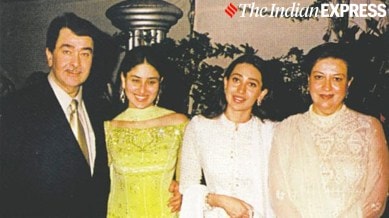📣 For more lifestyle news, click here to join our WhatsApp Channel and also follow us on Instagram
‘Are we hurting our child?’: What Kareena Kapoor’s story of her parents reuniting after decades apart tells us about love later in life and its ripple effect on adult children
Calling it a spiritual moment for the family, she added, “That is something that has come a full circle for Karisma and me which is absolutely, it’s like a divine kind of intervention which has happened.”

Actor Kareena Kapoor Khan recently shared that her parents, Randhir Kapoor and Babita, have decided to reunite in their later years after decades of living separately.
The couple, who never officially divorced, maintained mutual respect and co-parented their daughters, Karisma and Kareena, while living apart since 1988. Now, they’ve chosen to come back together in their old age, a moment Kareena describes as emotionally significant.
monthly limit of free stories.
with an Express account.
In a conversation with Mojo Story, she reflected on what this reunion means to her and her sister. “Now, they have decided to just spend their old age holding hands together because that’s where their journey started, and that’s exactly where they are together,” Kareena said.
Calling it a spiritual moment for the family, she added, “That is something that has come a full circle for Karisma and me, which is absolutely, it’s like a divine kind of intervention which has happened. Individually, I think both of them have been wonderful because I mean my father has always supported whatever I wanted to do in my life.” Kareena also acknowledged how her mother, Babita, raised them as a primary parent while maintaining respect for her father. “When Karisma joined films… it was our mother, Babita, who played the role of a primary parent and did her best of whatever she could.”
She added how her own experience has helped her self-reflect as a mother. She said, “Now that I’m a parent ,intentionally or unintentionally, we think ‘Are we hurting our child?’ ‘Are we like nobody really wants to do that?’ But they (Babita and Randhir) obviously, in a way, think that they’re giving their best shot.”
But, how common is it for couples who separated years ago to choose to reunite later in life?
Gurleen Baruah, existential psychotherapist at That Culture Thing, tells indianexpress.com, “ There’s no reliable data on how common these reconciliations are, but they do happen — and often quietly. Much depends on the individuals involved, their emotional history, and what stage of life they’re in. For some, later years bring a deep craving for companionship, shared memories, or a return to what once felt familiar. Nostalgia, loneliness, or even a softening of past anger can create space for reconnection. Sometimes, it’s simply two people who understand that time has reshuffled their priorities — and being together now makes more sense than it once did.”
The emotional impact such reunions have on adult children
“It’s deeply individual,” notes Baruah, adding that some adult children might feel joy or relief; others might feel confused, indifferent, or even betrayed by a narrative they had long accepted. There can be a quiet grieving of what could have been — childhoods reimagined through a new lens. For many, it’s bittersweet: a mix of warmth and disorientation.
Over time, some may come to appreciate the complexity of their parents’ relationship. But emotional processing doesn’t always happen instantly — it unfolds gradually.
Can later-life reconciliation strengthen familial bonds?
Reconciliation can bring healing, especially when it’s anchored in maturity and mutual respect. But it can also stir unresolved feelings from the past — for the couple and their family. What helps is giving the couple space to make their own decision without imposing narratives of ‘right’ or ‘wrong.’
Baruah explains, “Open communication can ease transitions: being honest about what this shift means for everyone, what roles might change, and what boundaries feel healthy. Love doesn’t always follow a linear path—and families that can sit with that ambiguity often grow stronger.”
📣 For more lifestyle news, click here to join our WhatsApp Channel and also follow us on Instagram